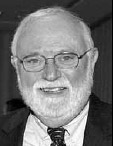
November 30, 2012
When Martin Ferris was a young man in Tralee, Co. Kerry, he was a member of the Kerry GAA Under 21 football team that won the 1973 All Ireland championship for his age group.
He had joined the provisional IRA in 1970, and in 1975, he was arrested and jailed for nine months in Portlaoise prison on robbery charges; a year later, he was imprisoned briefly on charges as an IRA member. In 1984, he was sentenced to ten years for his role in the infamous Valhalla incident, where a Boston-based trawler was caught transferring an arms cache to the ship Maita Ann off the coast of Kerry.
Gaining his freedom around the time of the Northern Ireland peace talks, Ferris became politically active in Sinn Féin, eventually winning elections in Kerry and Tralee in 1999. In 2002, he unseated former Tanaiste Dick Spring and took his North Kerry seat in Dáil Éireann , the Irish parliament.
Ferris was in Boston last month, and spoke before a luncheon gathering of the Irish American Partnership where he said his party is committed to “the prospects of a united Ireland, a new republic that we in Sinn Féin are trying to develop, a better place for those who live on the island, irrespective of past affiliations or associations. We can do this together and have a better country. Ireland has been a divided country.”
Ferris said that since the Good Friday Agreement 15 years ago, there has been much progress. “The agreement [calls for] a border poll where the people of the six counties can vote as to their future. I don’t think it should be about majority rule because majority rule has failed miserably in the past and created the divisions that are there.
“Working together across the sectarian divide, we believe firmly that in the emergence of a cordial unit, it may come down to actually small groups of people working together on both sides of the divide, reassuring people that were once your enemy that we are now in a different place and we want to work together, to bring about a better place for all children.
“That is happening right across the spectrum of the six counties,” Ferris said, adding, “From an economic point of view, you have a situation where there are two different corporation tax systems, two different economies, two police forces, two armies, two sectors of local government. You have a double up of everything that goes to make up the governance of society.
“We believe that it would be far more beneficial for the common good if you had just the one jurisdiction. We have to prove that politics works, that our strategy for Irish republicans is moving forward. We have to bring the broad republican family together with us in that direction, as we have managed to do, and we have to show there is a way to achieve our goals through the direction we are currently traveling.
“What you need to do is convince as many people within the unionist community that from an economic point of view it is beneficial for them to be in an all- Ireland economy and challenge them in a way that is respectful, that the arrangement between unionism and past British governments has always been contractual – in that economically it has been more beneficial to them, so we have to move that part around, the economy around, and I believe we can do that.”
Ferris said that as a young father he spent 13 years in jail, and was not there to support his wife Maire in raising their five young children. “The children suffered from the conflict. My family suffered because of my actions, my involvement in the armed struggle, and my imprisonment for 13 years. But the one thing I see about this new generation of Irish republicans is that they are very educated unlike myself.”
His said his daughter Toiréasa is a Sinn Fein councillor and former mayor of Tralee. “She has a law degree and a master’s in human rights. They see the world a lot different than I did when I was her age. In so far as there are an awful lot of gray areas out there, they seem to be looking for solutions, understanding that you’re not going to get everything that you want, but you’re going to get a solution that everyone can live with. That what I see in Toiréasa.
“You have all these great young people coming through and it’s very, very encouraging that we are offering an alternative to the people from the status quo, an alternative far more equitable and fair. I think the general public is responding to that, especially the younger people.
“We have come from the last election 20 months ago [February 2011] from 9.9 percent in the polls to … running anywhere between 18 and 22 percent. That’s a huge increase. But the United Ireland campaign that we are trying to build support for is not just Sinn Féin, it’s way bigger than Sinn Féin. It’s about people, it’s about children, it’s about families, it’s about having a structure in place that everybody can feel comfortable with and be part of it.
“And it’s also about having an economy to meet the need and requirements to serve the community and people, rather than the other way around, which we’ve been used to. If I ever do one thing in my life that in some way will help people going forward from here – if I can deliver is another matter – we will give it every breath in our body to try and make our country a better place for all people.”

